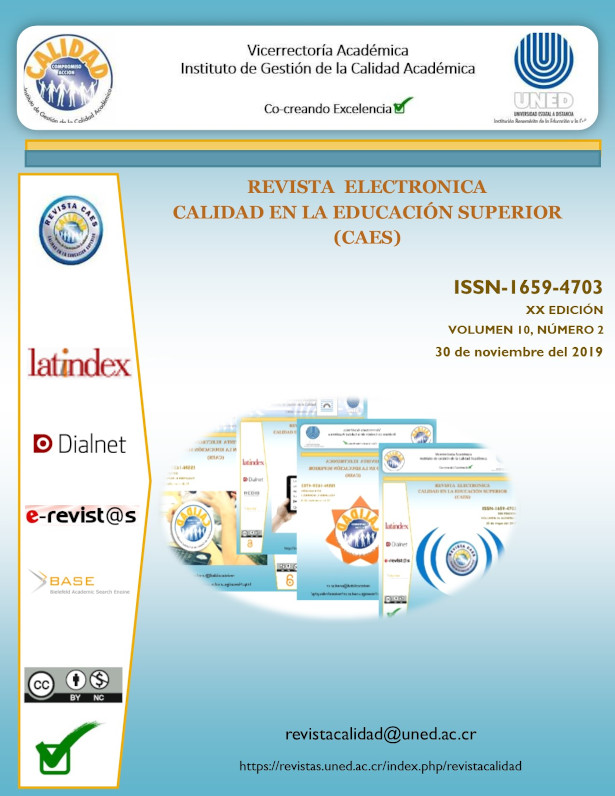Experience of the use of e-learning in the teaching of the subject Risk Management, cathedra of Finance of the UNED of Costa Rica
DOI:
https://doi.org/10.22458/caes.v10i2.2714Keywords:
e-learning, distance education, collaborative work, evaluate to learn, administration sciencesAbstract
This article presents a systematization of practical experience in the use of e-learning in the subject of Risk Management (04054), belonging to the Finance Chair of the School of Administration Sciences (ECA) of the UNED of Costa Rica, during the third academic period 2018. The challenge was to teach the subject under the 100% online modality that was traditionally offered through the traditional distance modality (tutorials, exams, short assignments and research work). The transition began with a curriculum redesign that supported the online offer, and with the technical-pedagogical advice of the Online Learning Program (PAL) of the UNED. The main results obtained were; Offer focused on communication and collaborative work, creation of three groups with the attention of different teachers, an evaluation of the offer was made from the perspective of the teacher and students. Among the main results after the evaluation of the experience, he highlighted the appropriate choice of content, strategies and the challenge of achieving a balance between activities and available time, among other aspects.
References
Avello, R., y Duart, J. (2016). Nuevas tendencias de aprendizaje colaborativo en e-learning: Claves para su implementación efectiva. Estudios pedagógicos (Valdivia), 42(1), 271-282. Recuperado de https://scielo.conicyt.cl/pdf/estped/v42n1/art17.pdf
Baki, R., Birgoren, B., & Aktepe, A. (2018). A Meta Analysis of Factors Affecting Perceived Usefulness and Perceived Ease of Use in the Adoption of E-Learning Systems. Turkish Online Journal of Distance Education, 19(4), 4–42. Recuperado de http://search.ebscohost.com/login.aspx?direct=true&db=eric&AN=EJ1192753&lang=es&site=ehost-live
Bertran, À; Martínez, M. y Gutiérrez, S. (2014). El perfil competencial de los graduados de Administración y Dirección de Empresas en línea: una visión desde el mercado de trabajo. (Spanish). RUSC: Revista de Universidad y Sociedad Del Conocimiento, 11(2), 13–26. Recuperado de http://search.ebscohost.com/login.aspx?direct=true&db=eue&AN=96332626&lang=es&site=ehost-live
CONARE. (1977). Nomenclatura de grados y títulos en la educación superior. San José, Costa Rica: Documento mimiegrafiado.
Dina, R., Onete, B. y Albastroiu, I. (2018). E-learning Paradoxes. Considerations about e-learning Future. ELearning & Software for Education, 4, 145–150. Recuperado de http://search.ebscohost.com/login.aspx?direct=true&db=eue&AN=129436886&lang=es&site=ehost-live
Duma, L., y Nagy, V. (2018). Curve-Based E-Learning Efficiency Grading. Vezetéstudomány / Budapest Management Review, (11), 45–54. Recuperado de http://search.ebscohost.com/login.aspx?direct=true&db=a9h&AN=133110716&lang=es&site=ehost-live
Gros, B. (2018). La evolución del e-learning: del aula virtual a la red. RIED: Revista Iberoamericana de Educación a Distancia, 21(2), 69–82. https://doi.org/10.5944/ried.21.2.20577. Recuperado de http://search.ebscohost.com/login.aspx?direct=true&db=fua&AN=130422584&lang=es&site=ehost-live
Gutiérrez, R. y García, A. (2016). ¿Cómo mejorar la calidad, la motivación y el compromiso estudiantil en la educación virtual? (Spanish). Campus Virtuales, 5(1), 74–82. Recuperado de http://search.ebscohost.com/login.aspx?direct=true&db=eue&AN=114762071&lang=es&site=ehost-live
La Gaceta. (1977). Ley de creación de la Universidad Estatal a Distancia (UNED), No 6044. Recuperado de https://www.uned.ac.cr/academica/images/Normativa/Ley_de_creacion.pdf
López, L., López, B. y Prieto, E. (2018). Tendencias innovadoras en la formación on-line. La oferta web de postgrados e-learning y blended-learning en España. (Spanish). Pixel-Bit, Revista de Medios y Educación, (53), 1–15. Recuperado de http://search.ebscohost.com/login.aspx?direct=true&db=eue&AN=131333245&lang=es&site=ehost-live
Messina, G., y Osorio, J. (2016). Sistematizar como ejercicio eco-reflexivo: La fuerza del relato en los procesos de sistematización de experiencias educativas. Revista e-Curriculum, 14(2), 601-624. Recuperado de http://www.redalyc.org/pdf/766/76646850011.pdf
Mora, E. y Ortiz, M. (2015). ¿Cómo fomentar el desarrollo de competencias en la formación on-line? Una experiencia en la asignatura de dirección estratégica. Teoría de La Educación. Educación y Cultura En La Sociedad de La Información, 16(2), 90–108. Recuperado de http://search.ebscohost.com/login.aspx?direct=true&db=fua&AN=108599402&lang=es&site=ehost-live
Pham, L., Williamson, S., & Berry, R. (2018). Student Perceptions of E-Learning Service Quality, E-Satisfaction, and E-Loyalty. International Journal of Enterprise Information Systems (IJEIS), 14(3), 19-40. Recuperado de https://www.igi-global.com/article/student-perceptions-of-e-learning-service-quality-e-satisfaction-and-e-loyalty/208144
Potcovaru, A. (2018). Using the Methods of e-Learning in Educational System. ELearning & Software for Education, 4, 208–215. Recuperado de http://search.ebscohost.com/login.aspx?direct=true&db=eue&AN=129436895&lang=es&site=ehost-live
Sarbabidya, S., & Shikdar, M. A. (2018). E-Learning for Career Development: The Case of Business Administration Graduates. World, 8(1), 13-27. Recuperado de http://wjsspapers.com/static/documents/March/2018/2.%20Surajit.pdf
Tapella, E., y Rodríguez, P. (2014). Sistematización de experiencias: una metodología para evaluar intervenciones de desarrollo. Revista de evaluación de Programas y Políticas Públicas, (3), 80-116. Recuperado de http://revistas.uned.es/index.php/REPPP/article/view/13361
UNED. (2012). Reglamento General Estudiantil. Recuperado de https://www.uned.ac.cr/academica/images/cidreb/reglamento/estudiantil/general_estudiantil.pdf
UNED. (2016). Consideraciones para el diseño y oferta de asignaturas en línea. Recuperado de https://www.uned.ac.cr/academica/images/vicerrectoria/documentacion/Consideraciones-diseno-oferta-asignaturas-linea.pdf
Downloads
Published
How to Cite
Issue
Section
License
Esta revista provee acceso libre inmediato a su contenido bajo el principio de que hacer disponible gratuitamente la investigación al publico, lo cual fomenta un mayor intercambio de conocimiento global.
